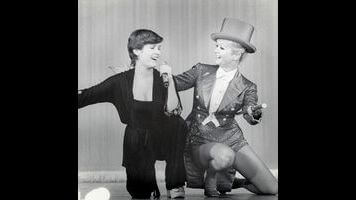Bright Lights is a memorial to the tenacity of Carrie Fisher and Debbie Reynolds

Evaluating Bright Lights: Starring Carrie Fisher And Debbie Reynolds would have been a much different task just a couple weeks ago. In late December, the titular mother and daughter died a day apart from one another, and it’s impossible to watch Fisher Stevens and Alexis Bloom’s film without those circumstances weighing on every frame. This chronicle of their relationship brims with as much tragic irony as it does joy. Take, for instance, when Fisher says, “My mother really wants me to be an extension of her wishes, an extension of her.” That comment both speaks to the intensity of their closeness and is irremovable from the context of their deaths, with Reynolds’ so quickly following Fisher’s. The documentary now functions as an unintentional memorial to the tenacity of these women and the fraught and powerful love they had for one another.
But even without the sadness that now floods Bright Lights, it would still be a classic of its kind. It recalls the equally entertaining late-in-life portraits of wonderful, vicious broads like Joan Rivers: A Piece Of Work and Elaine Stritch: Shoot Me; they all serve as reminders that we have to hold onto our icons tight and listen to their stories before they leave us. Many of the tales featured in Bright Lights will, naturally, be familiar even if you’re a passing a fan of Fisher and/or Reynolds. You might already know the story of how Reynolds and Eddie Fisher were America’s Sweethearts before he dumped her for her friend, Elizabeth Taylor. You’re also likely aware that Fisher struggled with drugs and her mental health. Extensive archival footage takes the viewer into the manicured, long ago past, while Fisher and Reynolds open the doors to their homes and minds.
The two lived adjacent to one another in a compound built by King Kong actor Robert Armstrong, and each house is a treat to visit, though Fisher’s is the real attraction. It’s a wild, wondrous den, with oddities like a player piano in a bathroom and a wall hung with paintings of ugly children, including one that looks like “Richard Dreyfuss as a young girl wielding a rose” (Fisher’s words). Although the house is seen through a lens operated by outsiders, being inside is as an intimate an experience as reading Fisher’s confessional prose. Goddamn if it isn’t fun to spend an hour and a half in the company of these ladies. Reynolds is the consummate show woman, forever “on.” Fisher, as always, is blisteringly funny, and unfailingly honest. They sing constantly; they accidentally wear the same shoes. Their dogs are a constant presence. (If you’re a fan of Gary Fisher and his tongue, you’ll be very happy.)
But in truth, mortality would have always loomed over the film, which is as much about this particular pair as it is about the strange, often distressing, alchemy of age and fame in Hollywood. Bright Lights is preoccupied with the passage of time and how that warps celebrity. Reynolds, despite growing feebler, refuses to pass up gigs in Las Vegas; Fisher is strong-armed into losing weight to appear in The Force Awakens. (In an eerie and frightening detail that recalls studio-system-era tyranny, Carrie says her trainer is required to send reports to Lucasfilm about her progress.) Their perseverance is cast in striking parallel to the trajectory of Reynolds’ ex, Fisher’s father, who died in 2010. He ended up as “a guy who used to be famous,” in the words of Fisher’s friend Griffin Dunne. Meanwhile, Reynolds is on stage singing “I’m Still Here,” the Stephen Sondheim anthem performed by Shirley MacLaine in Postcards From The Edge, Fisher’s fictionalized feature about a dysfunctional show business family.
It’s also no accident that Stevens and Bloom find symbolic material in Reynolds’ collection of old Hollywood artifacts. What the filmmakers unearth is not simple nostalgia, but an intense desire to preserve and consolidate the memory of an era before it dissipates. Reynolds had hoped to enshrine these objects in a museum, and she didn’t just want the Rat Pack’s suits—she sought their entire outfits, down to their underwear. When she’s forced to sell these items at auction, the defeat is not only personal but also historical. It stings even more now that she is gone and has taken that font of knowledge with her.
Bright Lights culminates with the events surrounding Reynolds’ SAG Lifetime Achievement Award in 2015. It should be a celebratory affair, but the honoree is ailing, and Fisher is shaken as she ferociously makes sure her mother will be able to receive her award comfortably. In an interlude between the rehearsal and ceremony, Stevens and Bloom zero in on Fisher getting her nails done. Funny Girl is on TV, and Fisher admits that she’s manic at the moment. When the process is done, she doles out a blend of glitter to her manicurists, insisting its properties are magical. “You are fucking amazing,” one tells her. Of course, she is, and Reynolds is, too. Bright Lights lets us bask in their glow for just a little longer.